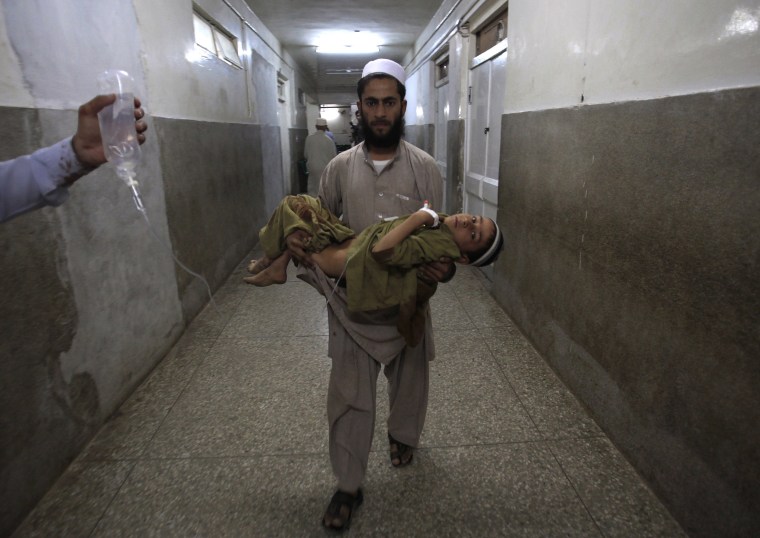A suicide bomber blew himself up Sunday in a market in northwest Pakistan crowded with shoppers ahead of a Muslim holiday, killing 12 people, including a mayor who once supported but had turned against the Taliban, officials said.
In the heavily guarded capital, police shot and killed another suicide bomber before he was able to detonate his explosives at a checkpoint, an officer said.
The incidents underscore the difficulty of combating militancy in Pakistan, where the Taliban have carried out a series of attacks in recent weeks. The militants have said the assaults are meant to avenge a government offensive in South Waziristan, the main Taliban and al-Qaida sanctuary in the country.
The suicide blast hit the town of Adazai, about 10 miles (16 kilometers) south of the main northwestern city of Peshawar.
The bomber hit as shoppers thronged a market where goats were being sold to celebrate the upcoming Muslim festival of Eid, killing the Adazi mayor, Abdul Malik, and 11 other people, including a young girl, said Sahibzada Anis, the top official in Peshawar.
'Turned into a hell'
"That place turned into a hell where the dead and injured were lying everywhere and blood and flesh were spread around," he said, adding that two of his relatives were badly injured. "Now we have our blood in this war," he said, vowing revenge against the attackers.
Twenty-five people were wounded, several critically, police officer Abdul Sattar Khan said.
Malik, the mayor, had once been a Taliban supporter but later switched sides and formed a local militia to help fight the militants. He had survived several attacks on his life in the recent past, said Anis.
A purported Taliban commander claimed responsibility for the attack.
"Our local fighters carried out this attack," said the commander, who gave only one name, Omar, by telephone from an undisclosed location. "He had set up a militia. He was supporting killings of our men. He was interfering in our matters." Omar, whose identity could not be confirmed, threatened to kill anyone who tried to create an anti-Taliban militia.
Militants have struck repeatedly in Pakistan in recent weeks, killing more than 300 civilians and soldiers in attacks aimed at weakening the government's resolve to continue the South Waziristan operation. Several attacks have taken place in Islamabad, home to just 900,000 people.
Late Sunday, police killed a suicide bomber as he ran toward a police checkpoint in a residential part of the city, said police chief Kalim Imam. The attacker was shouting "God is great!" — a traditional Islamic utterance when in danger, he said.
Fighting around South Waziristan
Pakistani troops have fought gunbattles in and around key Taliban towns in South Waziristan for several days.
The latest fighting Sunday there killed 20 militants and wounded eight soldiers, an army statement said.
Ten militants and two soldiers were also killed Sunday after a group of militants attacked a security checkpoint in the Mohmand tribal region to the north of Wazristan, an army official said. The official, speaking on condition of anonymity because he was not authorized to discuss the attack, said the militants fired on a Frontier Corps checkpoint with rockets and assault rifles but were repelled by government forces.
The military says hundreds of militants have been killed in the fighting in South Waziristan — a claim the Taliban dismisses. The area is sealed, and the figures are impossible to verify.
About 350,000 people have fled the fighting.
